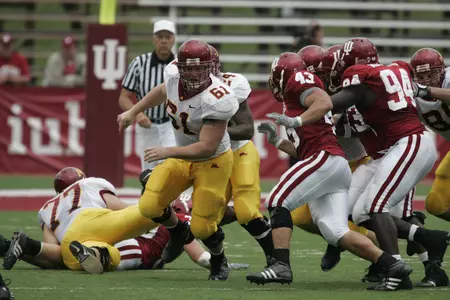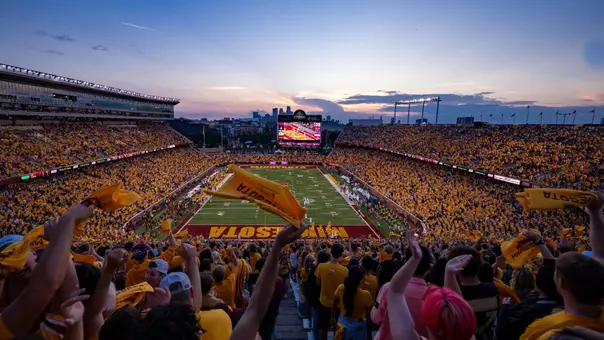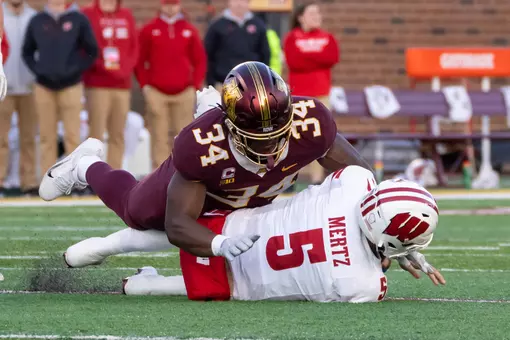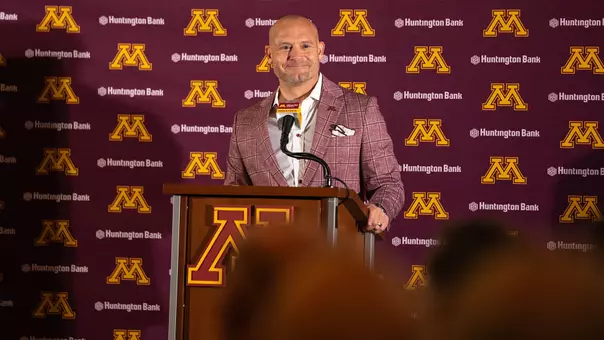University of Minnesota Athletics

Eslinger Named to College Football Hall of Fame Ballot
6/5/2023 10:10:00 AM | Football, M Club
Former Gopher great started all 50 games of his career and won the 2005 Outland Trophy and Rimington Trophy
Former University of Minnesota football great Greg Eslinger has been named to the College Hall of Fame ballot, announced today by the National Football Foundation (NFF). Eslinger is one of 78 former NCAA Football Bowl Subdivision players on the ballot for the 2024 class.
Eslinger is one of the best to ever wear the Maroon and Gold and is one of the most decorated offensive lineman in the history of the Big Ten.
He received the Outland Trophy (given to the nation's most outstanding interior lineman) and the Rimington Trophy (awarded to the nation's best center) in 2005. He was also named a First Team All-American in 2004 and 2005 and was a Unanimous All-American in 2005.
Eslinger was the 2005 Big Ten Offensive Lineman of the Year (only Gopher to ever receive this honor) and was awarded with the 2006 Big Ten Medal of Honor, which is the Big Ten's oldest and most prestigious award. He was Minnesota's first football player in school history to be named first-team all-conference by the media and coaches for three consecutive seasons.
The Bismarck, N.D. native, was also a Sporting News Freshman All-American in 2002 and a semifinalist for the Lombardi Award in 2004. Eslinger also received the now-defunct Jim Parker Trophy in 2005. The award was presented annually from 1991-2014 by the Touchdown club of Columbus and was given each year to the nation's most outstanding offensive lineman.
Eslinger shared Team MVP honors in 2005 with running back Laurence Maroney and he was named the team's Outstanding Offensive Player the same year. Eslinger received the team's Butch Nash Award (competitive on the field and in the classroom) in both 2003 and 2005.
He shined off the field as well, as he was named an Academic All-American in both 2004 and 2005. Eslinger was also named a Draddy Trophy finalist and one of 16 members of the 2005 National Scholar-Athlete Class as selected by the NFF. He was the only Big Ten player chosen from a national pool of 184 nominees. The Draddy Trophy, now known as the William V Campbell Trophy, recognizes the best gridiron scholar-athlete in the nation.
With Eslinger leading the way, Minnesota posted a record of 32-18 during his career and the Gophers had a winning record all four seasons (2002-05). Minnesota had a losing record the year before (2001) Eslinger arrived and the year after (2006) he left. Minnesota played in four straight bowl games with Eslinger on the roster, and that was the first time in school history that the Gophers played in four straight bowl games. Eslinger was a Team Captain in 2004 and 2005.
Minnesota had some of its most productive offenses in school history when Eslinger was lined up at center. The Gophers set single-season offensive records for rushing attempts (683), rushing yards (3,759), rushing yards per game (289.2), rushing touchdowns (46), total season yards (6,430), total yards per game (494.8), total season points (503), average points per game (38.7), season touchdowns (66) and first downs (326) when Eslinger was paving the way for Minnesota's dynamic offense.
In 2014, Eslinger was named to Athlon Sports Top 50 College Football Players of the BCS era (1998-2013). He ranked 34th on the list right behind LaDanian Tomlinson (30th), Robert Griffin III (31st), Reggie Bush (32nd) and Drew Brees (33rd).
After his college career, he was drafted by the Denver Broncos in the sixth round with the 198th pick. He spent time with Denver, Cleveland and Houston from 2006-08.
College Football Hall of Fame Criteria:
To be eligible for the College Football Hall of Fame, players must have been named a First Team All-American by a major/national selector as recognized and utilized by the NCAA for their consensus All-America teams; played their last year of intercollegiate football at least 10 full seasons prior; played within the last 50 years; and cannot be currently playing professional football. Coaches must have coached a minimum of 10 years and 100 games as a head football coach; won at least 60 percent of their games; and be retired from coaching for at least three full seasons. If a coach is retired and over the age of 70, there is no waiting period. If he is over the age of 75, he is eligible as an active coach. In all cases, the candidate's post-football record as a citizen may also be weighed.
Voting Background:
Once nominated for consideration, all FBS player candidates are submitted to one of eight District Screening Committees, depending on their school's geographic location, which conducts a vote to determine who will appear on the ballot and represent their respective districts. Each year, approximately 15 candidates, who are not selected for the Hall of Fame but received significant votes in the final selection, will be named automatic holdovers and will bypass the district screening process and automatically appear on the ballot the following year. Additionally, the Veterans Committee may make recommendations to the Honors Court for exceptions that allow for the induction of players who played more than 50 years ago.
The ballot will be emailed to the more than 12,000 NFF members and current Hall of Famers whose votes will be tabulated and submitted to the NFF's Honors Court, which deliberates and selects the class. The Honors Court, chaired by NFF Board Member and College Football Hall of Famer Archie Griffin from Ohio State, includes an elite and geographically diverse pool of athletic administrators, Hall of Famers and members of the media.
The announcement of the 2024 College Football Hall of Fame Class will be made in early 2024, with specific details to be announced in the future. The Class will be officially inducted during the 66th NFF Annual Awards Dinner Presented by Las Vegas on Dec. 10, 2024, and permanently immortalized at the Chick-fil-A College Football Hall of Fame in Atlanta.
Of the 5.62 million individuals who have played college football since Princeton first battled Rutgers on Nov. 6, 1869, only 1,074 players have earned induction into the College Football Hall of Fame, or less than two one-hundredths of a percent (.02%) of those who have played the game during the past 153 seasons. From the coaching ranks, 230 individuals have achieved Hall of Fame distinction.
Eslinger is one of the best to ever wear the Maroon and Gold and is one of the most decorated offensive lineman in the history of the Big Ten.
He received the Outland Trophy (given to the nation's most outstanding interior lineman) and the Rimington Trophy (awarded to the nation's best center) in 2005. He was also named a First Team All-American in 2004 and 2005 and was a Unanimous All-American in 2005.
Eslinger was the 2005 Big Ten Offensive Lineman of the Year (only Gopher to ever receive this honor) and was awarded with the 2006 Big Ten Medal of Honor, which is the Big Ten's oldest and most prestigious award. He was Minnesota's first football player in school history to be named first-team all-conference by the media and coaches for three consecutive seasons.
The Bismarck, N.D. native, was also a Sporting News Freshman All-American in 2002 and a semifinalist for the Lombardi Award in 2004. Eslinger also received the now-defunct Jim Parker Trophy in 2005. The award was presented annually from 1991-2014 by the Touchdown club of Columbus and was given each year to the nation's most outstanding offensive lineman.
Eslinger shared Team MVP honors in 2005 with running back Laurence Maroney and he was named the team's Outstanding Offensive Player the same year. Eslinger received the team's Butch Nash Award (competitive on the field and in the classroom) in both 2003 and 2005.
He shined off the field as well, as he was named an Academic All-American in both 2004 and 2005. Eslinger was also named a Draddy Trophy finalist and one of 16 members of the 2005 National Scholar-Athlete Class as selected by the NFF. He was the only Big Ten player chosen from a national pool of 184 nominees. The Draddy Trophy, now known as the William V Campbell Trophy, recognizes the best gridiron scholar-athlete in the nation.
With Eslinger leading the way, Minnesota posted a record of 32-18 during his career and the Gophers had a winning record all four seasons (2002-05). Minnesota had a losing record the year before (2001) Eslinger arrived and the year after (2006) he left. Minnesota played in four straight bowl games with Eslinger on the roster, and that was the first time in school history that the Gophers played in four straight bowl games. Eslinger was a Team Captain in 2004 and 2005.
Minnesota had some of its most productive offenses in school history when Eslinger was lined up at center. The Gophers set single-season offensive records for rushing attempts (683), rushing yards (3,759), rushing yards per game (289.2), rushing touchdowns (46), total season yards (6,430), total yards per game (494.8), total season points (503), average points per game (38.7), season touchdowns (66) and first downs (326) when Eslinger was paving the way for Minnesota's dynamic offense.
In 2014, Eslinger was named to Athlon Sports Top 50 College Football Players of the BCS era (1998-2013). He ranked 34th on the list right behind LaDanian Tomlinson (30th), Robert Griffin III (31st), Reggie Bush (32nd) and Drew Brees (33rd).
After his college career, he was drafted by the Denver Broncos in the sixth round with the 198th pick. He spent time with Denver, Cleveland and Houston from 2006-08.
College Football Hall of Fame Criteria:
To be eligible for the College Football Hall of Fame, players must have been named a First Team All-American by a major/national selector as recognized and utilized by the NCAA for their consensus All-America teams; played their last year of intercollegiate football at least 10 full seasons prior; played within the last 50 years; and cannot be currently playing professional football. Coaches must have coached a minimum of 10 years and 100 games as a head football coach; won at least 60 percent of their games; and be retired from coaching for at least three full seasons. If a coach is retired and over the age of 70, there is no waiting period. If he is over the age of 75, he is eligible as an active coach. In all cases, the candidate's post-football record as a citizen may also be weighed.
Voting Background:
Once nominated for consideration, all FBS player candidates are submitted to one of eight District Screening Committees, depending on their school's geographic location, which conducts a vote to determine who will appear on the ballot and represent their respective districts. Each year, approximately 15 candidates, who are not selected for the Hall of Fame but received significant votes in the final selection, will be named automatic holdovers and will bypass the district screening process and automatically appear on the ballot the following year. Additionally, the Veterans Committee may make recommendations to the Honors Court for exceptions that allow for the induction of players who played more than 50 years ago.
The ballot will be emailed to the more than 12,000 NFF members and current Hall of Famers whose votes will be tabulated and submitted to the NFF's Honors Court, which deliberates and selects the class. The Honors Court, chaired by NFF Board Member and College Football Hall of Famer Archie Griffin from Ohio State, includes an elite and geographically diverse pool of athletic administrators, Hall of Famers and members of the media.
The announcement of the 2024 College Football Hall of Fame Class will be made in early 2024, with specific details to be announced in the future. The Class will be officially inducted during the 66th NFF Annual Awards Dinner Presented by Las Vegas on Dec. 10, 2024, and permanently immortalized at the Chick-fil-A College Football Hall of Fame in Atlanta.
Of the 5.62 million individuals who have played college football since Princeton first battled Rutgers on Nov. 6, 1869, only 1,074 players have earned induction into the College Football Hall of Fame, or less than two one-hundredths of a percent (.02%) of those who have played the game during the past 153 seasons. From the coaching ranks, 230 individuals have achieved Hall of Fame distinction.
Winter Workouts Begin
Monday, February 02
Barber & Maroney III Highlights
Thursday, January 29
Coach Fleck Postgame at Rate Bowl
Tuesday, January 06
Cinematic Recap: Gophers Win Ninth Straight Bowl
Friday, January 02


.png&width=42&height=42&type=webp)




